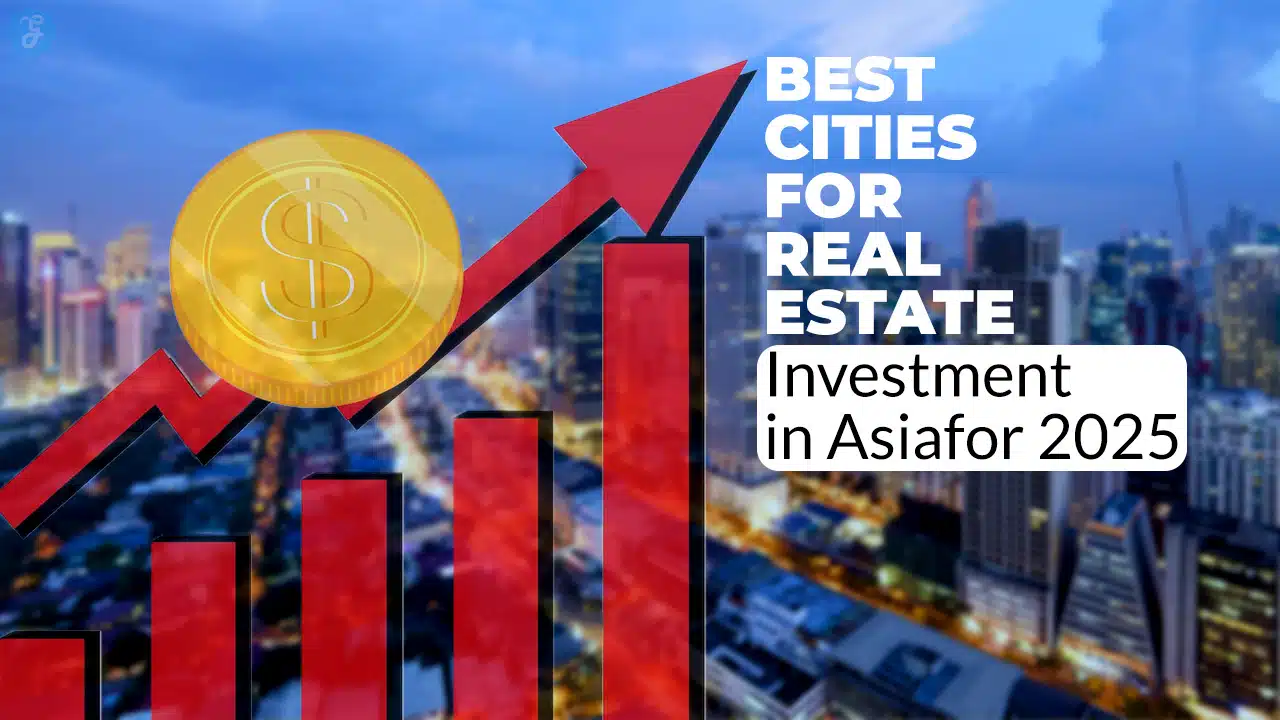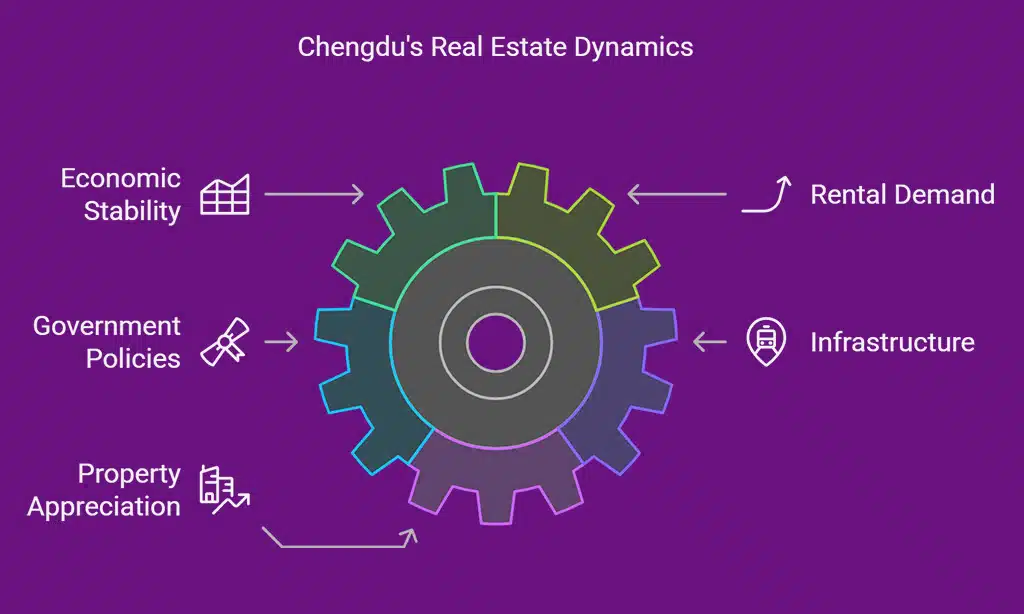Asia is one of the fastest-growing real estate markets in the world, attracting investors seeking high returns, economic stability, and long-term growth. With urbanization, infrastructure development, and business expansion on the rise, many Asian cities offer lucrative opportunities for real estate investment.
This article explores the best cities for real estate investment in Asia, providing insights into why they are prime locations for property buyers, rental income seekers, and investors looking to capitalize on the region’s booming economy.
Whether you’re eyeing residential, commercial, or mixed-use properties, these cities offer compelling reasons to invest in 2025.
Top 15 Cities for Real Estate Investment in Asia
Asia offers diverse and promising real estate opportunities, attracting investors worldwide. The region’s economic growth, infrastructure development, and urbanization trends make it a lucrative market for real estate investments.
Below is a carefully curated list of the best cities for real estate investment in Asia, each offering unique advantages for investors.
1. Singapore: A Global Financial Hub
Singapore’s real estate market is one of the most stable and profitable in Asia. The city-state boasts a strong economy, excellent infrastructure, and transparent legal policies that attract investors worldwide. With a growing demand for luxury apartments, commercial spaces, and rental properties, Singapore continues to be a top choice for real estate investments.
Government initiatives, such as tax incentives for foreign investors and infrastructure developments, further strengthen its appeal. The city’s strong rental market and low vacancy rates make it an ideal location for both short-term and long-term investments.
| Key Factors | Details |
| Economic Stability | Strong GDP growth and financial sector |
| Rental Demand | High demand for luxury and expatriate rentals |
| Government Policies | Investor-friendly regulations and tax benefits |
| Infrastructure | World-class transport and business hubs |
| Property Appreciation | Consistent price growth |
2. Tokyo, Japan: The Safe Investment Choice
Tokyo is an economic powerhouse with a highly stable real estate market. As Japan’s capital and largest city, Tokyo is home to multinational corporations, financial hubs, and a massive population that ensures strong property demand. Despite high property prices, the city provides excellent rental yields, making it a lucrative investment destination. Government incentives for foreign investors and upcoming infrastructure projects ahead of international events further enhance its potential for capital appreciation.
| Key Factors | Details |
| Economic Stability | Strong GDP, stable market |
| Rental Demand | High demand from local and expat communities |
| Government Policies | Foreign investor-friendly |
| Infrastructure | Expanding public transit and business districts |
| Property Appreciation | Steady and long-term growth |
3. Bangkok, Thailand: High ROI and Tourist Demand
Bangkok’s real estate market is flourishing, driven by tourism, expatriate demand, and a growing local economy. The city offers affordable property prices compared to other major Asian capitals, making it an attractive option for investors.
With its thriving hospitality sector and strong rental demand, Bangkok is ideal for short-term rental investments such as Airbnb. Infrastructure developments, including new metro lines and airport expansions, are further boosting property values.
| Key Factors | Details |
| Economic Stability | Fast-growing economy |
| Rental Demand | High demand from tourists and expats |
| Government Policies | Favorable for foreign ownership |
| Infrastructure | Expanding metro and road networks |
| Property Appreciation | Increasing demand in central areas |
4. Kuala Lumpur, Malaysia: Emerging Market with Growth Potential
Kuala Lumpur is an emerging real estate market with high rental yields and affordable property prices. The government’s Malaysia My Second Home (MM2H) program encourages foreign property ownership, making it easier for investors to enter the market.
The city’s growing expatriate and business population increases demand for rental properties. Infrastructure projects such as new transit lines and smart city initiatives are improving livability and property values.
| Key Factors | Details |
|---|---|
| Economic Stability | Strong market growth |
| Rental Demand | Rising demand from expatriates |
| Government Policies | Encouraging foreign investment |
| Infrastructure | Rapid urban development |
| Property Appreciation | Increasing in prime areas |
5. Ho Chi Minh City, Vietnam: Fastest Growing Economy
Ho Chi Minh City is Vietnam’s economic hub and one of the fastest-growing real estate markets in Asia. The city’s rapid urbanization, growing middle class, and increasing foreign investments make it an excellent destination for property buyers.
The government has introduced investor-friendly policies, including relaxed foreign ownership laws, further boosting its appeal. The high demand for residential and commercial properties ensures strong rental yields and long-term appreciation.
| Key Factors | Details |
| Economic Stability | Booming economy |
| Rental Demand | Strong demand for residential and commercial spaces |
| Government Policies | Foreign ownership laws relaxed |
| Infrastructure | Rapid expansion of metro and highways |
| Property Appreciation | Consistently increasing |
6. Seoul, South Korea: A Tech-Driven Real Estate Boom
Seoul is a top destination for real estate investment due to its robust economy, thriving tech industry, and high demand for residential and commercial properties. The city attracts a mix of local and international investors, thanks to its strong rental market and high property appreciation.
Government initiatives, including smart city projects and green developments, make Seoul an attractive long-term investment option. The city’s urban development and well-connected transportation network add further value to real estate investments.
| Key Factors | Details |
| Economic Stability | Strong economy, global tech hub |
| Rental Demand | High demand from professionals and expats |
| Government Policies | Pro-investment regulations and incentives |
| Infrastructure | Smart city projects and modern transit systems |
| Property Appreciation | Rising demand in urban districts |
7. Shanghai, China: Financial Center with High Rental Demand
Shanghai is China’s financial capital and a prime location for real estate investments. The city’s strong economy, international business presence, and steady urbanization drive high demand for residential and commercial properties.
Rental yields remain strong, especially in business districts and expatriate-friendly neighborhoods. Shanghai’s extensive infrastructure, including world-class transportation and economic zones, further enhances its appeal to investors.
| Key Factors | Details |
| Economic Stability | Leading financial hub of China |
| Rental Demand | High demand from businesses and expats |
| Government Policies | Stable regulations for foreign investors |
| Infrastructure | Advanced public transport and tech parks |
| Property Appreciation | High-value areas continue to grow |
8. Jakarta, Indonesia: Affordable Market with Long-Term Growth Potential
Jakarta presents an excellent opportunity for real estate investors looking for affordability and long-term growth. As Indonesia’s capital, the city is experiencing rapid urban expansion, increasing the demand for housing and commercial spaces.
Ongoing infrastructure projects, including MRT expansion and smart city initiatives, enhance Jakarta’s real estate prospects. The relatively low cost of properties and high rental yields make it an attractive investment destination.
| Key Factors | Details |
| Economic Stability | Growing economy with stable demand |
| Rental Demand | Rising demand from urbanization |
| Government Policies | Encouraging foreign investments |
| Infrastructure | MRT expansion and new economic zones |
| Property Appreciation | Expected steady growth |
9. Manila, Philippines: Strong Rental Yields Due to Rapid Urbanization
Manila is one of Asia’s fastest-growing real estate markets, driven by strong demand for residential and commercial properties. The influx of expatriates and growing BPO (Business Process Outsourcing) industry fuel the city’s rental demand.
Affordable property prices and high rental yields make Manila an ideal choice for investors seeking short-term and long-term gains.
| Key Factors | Details |
| Economic Stability | Strong GDP growth |
| Rental Demand | High demand from BPO sector and expats |
| Government Policies | Foreign ownership incentives |
| Infrastructure | Ongoing urban development projects |
| Property Appreciation | High appreciation in business hubs |
10. Mumbai, India: Expanding Commercial Real Estate Opportunities
Mumbai, India’s financial capital, boasts a thriving real estate market with a high demand for both residential and commercial spaces. The city’s growing population, rising middle class, and corporate expansion contribute to increasing property values. Government-driven smart city projects and metro expansions further boost Mumbai’s investment potential.
| Key Factors | Details |
| Economic Stability | Financial capital of India |
| Rental Demand | High demand from professionals and businesses |
| Government Policies | Investment-friendly reforms |
| Infrastructure | Expanding metro and business zones |
| Property Appreciation | Steady increase in key districts |
11. Bangalore, India: IT Hub with Strong Residential and Rental Demand
Bangalore, known as India’s Silicon Valley, is a hotspot for real estate investment due to its booming IT sector and high demand for rental properties. The influx of professionals and expatriates ensures a strong rental market, while infrastructure improvements, including metro expansions and smart city initiatives, enhance long-term property appreciation.
| Key Factors | Details |
| Economic Stability | Thriving IT and startup ecosystem |
| Rental Demand | High due to tech professionals and students |
| Government Policies | Pro-business and tech-driven policies |
| Infrastructure | Expanding metro and smart city projects |
| Property Appreciation | Growing demand in tech corridors |
12. Chengdu, China: Business-Friendly Environment with Rising Real Estate Value
Chengdu is emerging as one of China’s top real estate markets, fueled by a strong economy, strategic location, and increasing foreign investments. The city offers a lower cost of living compared to Beijing and Shanghai while maintaining strong growth prospects in both commercial and residential sectors.
| Key Factors | Details |
| Economic Stability | Rapidly growing economic hub |
| Rental Demand | High due to growing population |
| Government Policies | Foreign investment incentives |
| Infrastructure | Expanding metro and business districts |
| Property Appreciation | Strong appreciation in prime locations |
13. Hanoi, Vietnam: Emerging Hotspot with Rapid Economic Development
Hanoi’s real estate market is gaining traction due to Vietnam’s robust economic growth and foreign investment influx. The city is experiencing increasing demand for high-quality residential and commercial properties, making it a profitable choice for investors.
| Key Factors | Details |
| Economic Stability | Strong economic expansion |
| Rental Demand | High demand from expatriates |
| Government Policies | Attractive for foreign ownership |
| Infrastructure | Major infrastructure upgrades |
| Property Appreciation | Growing in commercial zones |
14. Phnom Penh, Cambodia: Investor-Friendly Laws with High Rental Returns
Phnom Penh offers one of Southeast Asia’s most investor-friendly real estate markets, with relatively low property prices and high rental returns. The city’s rapid urbanization and economic stability make it a promising investment location.
| Key Factors | Details |
| Economic Stability | Stable and growing economy |
| Rental Demand | High due to urban migration |
| Government Policies | No restrictions for foreign buyers |
| Infrastructure | Expanding road and transport networks |
| Property Appreciation | Steady growth in key districts |
15. Taipei, Taiwan: Stable Economy and Premium Property Market
Taipei’s real estate market is known for its stability and strong capital appreciation. The city offers a high standard of living, making it a desirable location for both residents and investors. Government policies ensure a secure investment environment.
| Key Factors | Details |
| Economic Stability | Strong, stable economy |
| Rental Demand | High due to quality of life and business centers |
| Government Policies | Secure investment laws |
| Infrastructure | Advanced transport and tech ecosystem |
| Property Appreciation | Premium property value growth |
Key Factors to Consider Before Investing in Asian Real Estate
Investing in the best cities for real estate investment in Asia requires careful planning and thorough research. Before making a decision, consider these critical factors to maximize returns and mitigate risks.
Legal and Regulatory Considerations
- Foreign Ownership Laws: Each country has different regulations on foreign ownership. Some allow full ownership, while others restrict foreign investors to leasehold or joint ventures.
- Tax Policies: Investors should evaluate property taxes, capital gains taxes, and any additional levies imposed on foreign buyers.
- Legal Protections: Ensuring that property rights are well-protected under a transparent legal framework is crucial to a safe investment.
- Visa and Residency Benefits: Some countries offer residency programs to real estate investors, which can provide long-term benefits beyond property ownership.
Market Trends and Economic Indicators
- GDP Growth: A strong and growing economy often translates to higher real estate demand and value appreciation.
- Inflation and Interest Rates: These economic factors impact mortgage rates, rental returns, and overall investment profitability.
- Urbanization and Infrastructure Development: Cities undergoing rapid development, such as new business districts and transportation hubs, often provide better long-term investment opportunities.
- Supply and Demand Trends: Understanding the balance between housing demand and property supply is essential to avoid investing in an oversaturated market.
Risks and Challenges
- Political and Economic Stability: Fluctuations in government policies, economic downturns, and geopolitical risks can impact real estate values.
- Regulatory Changes: Sudden changes in laws regarding foreign investment, taxation, or rental policies can affect profitability.
- Oversupply in Some Regions: Overdevelopment can lead to reduced rental yields and longer vacancy periods.
- Currency Fluctuations: For international investors, exchange rate volatility can impact returns when converting rental income or selling assets.
Tips for Successful Real Estate Investment in Asia
- Conduct Thorough Market Research: Study local property trends, rental yields, and future development plans before making a purchase.
- Work with Local Experts: Engage reputable real estate agents, legal advisors, and financial consultants to navigate the complexities of foreign property investment.
- Diversify Your Portfolio: Consider investing in multiple locations or property types to spread risks and maximize returns.
- Understand Exit Strategies: Plan for different exit options, including resale, rental, or property flipping, based on market conditions.
- Assess Long-Term Potential: Focus on cities with stable economic growth, strong demand, and continuous infrastructure improvements to ensure lasting value appreciation.
Takeaways
Investing in the best cities for real estate investment in Asia offers immense opportunities for capital appreciation and rental income. With thorough research, legal due diligence, and strategic planning, investors can benefit from Asia’s dynamic property market in 2025.






































